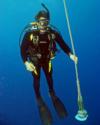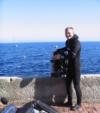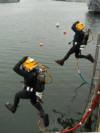
|
I had problems in the beginning. Equalizing, water in the ear and a few infections. Now I do the following. 2 days before a dive, or dive trip, I start using Claritin, or similar. I take one every day right through the day of the dives or the dive trip. Also, keep the water OUT of your ears. How? Doc’s Pro Plugs (vented of course) or Aqua Seals. I will not dive without them, especially cold water. A ENT specialist told me to avoid cold water in the inner ear if at all possible. I still need a little more time than most to equalize, but the issue is behind me and I do not fear any ear/sinus problems. Hope this helps.
PS - Some buddies who took my advice now swear by the plugs and decongestant program. Good luck and safe diving......... Joe P
|
|

|
as we have found out during some of our classes students fail to reveal that they have had a cold or some other sinus problem and of course the pain sets in. Rule of thumb is you don’t dive for 2 to 3 weeks after having some form of sinus problem. It has been proven that taking medications such as sudafed don’t necessarily work for everyone. Even if they do work they generally will not last long while diving. For example if its a 12 hour medication it generally quits working about 15 to 20 minutes into the dive and hence problem returns at depth. So as PADI recommends and DAN don’t dive with any type of a sinus problem.
|
|

|
From my experience any pain in your sinus is serious and should be treated before diving. The main reason I would be scared is the possibility of a reverse block. Sinus pressure on the way down is a good warning to abort the dive. But if you make it all the way down and develope a reverse block you can tear your ear drum and cause serious damage with no other option than to come up before you run out of air. I’ve been there. I pushed it too early after treatment from an ear infection. It took me a while to get down, but made it and thought I was home free. Coming back up at the end of the dive I felt horrible pain, as well as periods of vertigo. I worked it slowly, a couple feet at a time, but the pain stayed with me all the way to the surface. Two days later I went to the doctor because my ear was so sore. She said my ear drum was traumatized and there was a possibility of a slight tear, and I needed to take at least two months off from diving. Waiting would have been smarter.
My first year of diving led to 4 sinus infections, each one worse than the previous. A good antibiotic should take care of the infection, and sometimes a sinus flush will help get some of the gunk out of your head aferwards. But the gunk typically works its way out by itself. I had one severe sinus infection which got worse with the first two antibiotics (I must have developed a resistance) and required a super strong "shotgun" antibiotic given in hospitals to finally reverse the infection. On the second day of that drug a giant "plug" of gunk came out during a sneeze the size of a pencil eraser. That thing was stuck in a tiny tube behind my eye?!? It certainly explained the pain.
I then discovered Doc’s Pro Plugs. They do allow water into the ear because they are vented with a small hole. But they also prevent the constant in & out flushing of bacteria infested sea water. The theory is that an ear will clear/equalize more easily in warm water than cold. The plug keeps the water inside and your head keeps that water warm. Since I started using them, almost three years now, I have not had a single ear or sinus infection. And since I don’t believe in cooincidences....I won’t dive without them.
Hope this helps.
|
|

|
As I’ve gotten older I find I need to start Sudafed the day before the dive, DAN suggest the 4 hour and not the 12 and I have some in the dry bag so it doesn’t wear off while I’m on the boat.
A sinus rinse seems to help but I just read a warning about using local tap water in them, same reason you don’t drink the local tap water!
|
|

|
I use a product called clear sinus , It was given to me by a dive operator in Cozumel . I had a cold ,and my sinuses were blocked and it allowed me to make the dive. It is a homiopathic remedy , you can get it on line. My doctor prescribed a steroid called veramyst nasal spray, and it seems to work too. You must start taking it couple days before dive.
|
|

|
I tend to have problems with equalizing and kept thinking it was sinus. By trial and error, I discovered it happens when I’m diving in a new location and nervous, usually springs with deep/overhead environments. I’ve called some dives, but always try again, and as I get familiar with a site I stop having problems. Maybe it’s an anxiousness thing for the student.
|
|

|
The only thing that I could recommend is to have the diver consult with an Ear, Nose, Throat (ENT) specialist who is familiar with the physical requirements of SCUBA. DAN might be able to point the diver in the right direction...
|
|

|
I recently started having issues with sinus squeeze on second an later dives. This is not the same as an ear equalization problem. Sinus squeeze is a partial sinus blockage that may not interere with breathing. I’ve been able to successfully fight it with slow decents and pinching the nose and blowing until I get enough depth that the blockage seems to let off. I discussed this with my doctor and she suggested either a nettipot or saline sinus spray.
|
|

|
Greg - 9/16/2011 5:30 PM 
Thank you for all the replies! The student in question appreciates all the feedback.
The student recently met with an ENT and told the doctor about the pressure she felt in her sinuses and that she felt that way for quite some time. He checked her ears and they were clear. The doctor needs to get an MRI to see what is going on in her sinuses; however, protocol dictates a 21 day regiment of antibiotics and chromatic nasal spray. After the 21 days, if she is not better, he will prescribe an MRI. The ENT may also decided to scrape her sinuses.
|
|

|
Hi Kristin, the problem you describe is the same problem we have had with many new divers or divers who haven’t been diving for a long time. Sometimes its like you described with diving in a new location and being unfamiliar with the new dive site. What happens in these situations is that the diver is biting down really hard on their regulator mouth piece which is clenching the jaw muscles clamp down on the tubes to your ears preventing the diver from being able to equalize. The answer is to try and relax, take some good deep breathes and if necessary descend feet first.. Anxiety can and does cause many problems, the best way I know of to help is talk to someone who is familiar with the dive site and get as much information as possible. Hope this helps, I know this may be information you already know but it doesn’t hurt to review from time to time.
|
|

|
I had this problem happen to me when I first got back into diving after years of a break. After a few dives that were perfectly fine, I went back into the water and just as you said, it hit me around 5 feet and below. Right behind/above my left eye was a horrible pain, I has to ascend to the surface to relieve it. I was very worried and email the DAN Emergency Hotline. They gave me a prompt response saying I should call a ENT doctor to get checked out. I did so, and they just said I have HORRIBLE allergies and the inside of my nostrills were the brightest red/inflamed they have seen. Now the allergies are slowly going away, I have had no problems and dive roughly every week or two. I have not taken any medication nor was perscribed anything, they just said over the counter allergy medicine might work. Hope this helps a bit.
I did notice however, that when this did happen to me, I would get out of the water for about 45 minutes and was able to go back in with no pain.. hopefully your students can do this as well.
|
|

|
I’ve been going to an allergist for the last 25 years for sinus congestion caused by seasonal allergies. Things such as Claratin, Zyrtec, or Allegra are great to take ahead of time, but, they usually take a week to truly be effective. They help the body stop the overproduction of the mucous that causes that sinus pressure. The Sudafed dries you up, so it keeps it from running. I also use it with a nose spray, and, to help my body rid itself of the mucous, I use a saline sinus rinse (some people prefer a neti pot). Your doctor can best recommend which thing is best for you. Most of these things are now available over the counter.
Going to an ENT is good to ensure there is nothing physically wrong with you, but, if problems persist, I’d suggest seeing an allergist to get on a "program" that works for you.
|
|

|
i didnt read all of them, so im not sure if this was already said, but i have used a netti-pot (or whatever they are called) and that worked pretty good. the thing where you put warm water in that little plastic pot, add some salt to it, and then squirt it up one nostril and it comes out the other. clears a lot of stuff out.
|
|